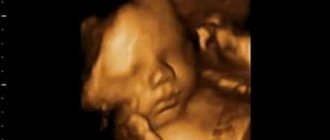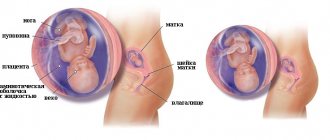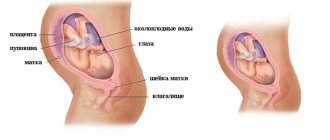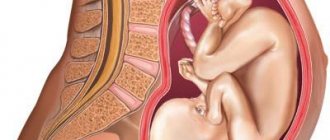Five weeks have passed since the fertilization of the egg, and the 7th obstetric week of pregnancy has begun.
- What changes will happen to the embryo at this stage of pregnancy?
- How does the expectant mother feel and what changes in her condition should alert her?
- Do I need to go to the gynecologist, do an ultrasound and take tests at the current stage?
- What recommendations should you follow in the 7th obstetric week of pregnancy?
- Vitamins
- Approved medications
Embryo. Development at 7th week
Embryo development in the 7th week of pregnancy
At the 7th obstetric week of pregnancy, the embryo continues to actively develop: the process of formation, improvement and inclusion of the necessary systems and organs continues. In 5 weeks after fertilization, the future baby has grown from one cell into a small organism weighing about a gram and a body length of about 10 mm. He looks more and more like a person externally and internally: the rudiments of all organs have formed, the most important systems are gradually being put into operation.
- The body of the embryo still resembles the letter C, but is gradually straightening and transforming. If you look closely, this week you can clearly see where the neck will be, how quickly the arms and legs have grown. The miniature fingers have already been drawn, but have not yet separated. They are connected to each other by a thin film, which will disappear a little later. Gradually lengthening hands and feet are transformed, you can see how shoulders and forearms appear.
- The tail, clearly visible 2 weeks ago, becomes barely noticeable, gradually becoming incorporated into the actively developing cartilage of the spine.
- The nervous system, one of the most complex functional parts of the human body, is actively working this week: it controls the processes of organogenesis (the formation of organs and systems), gives orders to cells to work correctly. It has not yet completed its development, but is already playing a key role. At the 7th week of pregnancy, a network of nerve endings grows into the arms and legs, and the embryo begins to move them. It is at the current stage that the unborn baby begins to move, but due to its tiny size, the mother cannot yet feel it.
- At the 7th obstetric week of pregnancy, the embryonic brain is actively developing. Future hemispheres gradually emerge from the brain bubbles, and division into zones and sections occurs. Every day, thousands of new nerve cells are formed in the brain, which in the future will allow the child to learn everything he needs.
- The cardiovascular system is becoming more and more advanced. At the 7th obstetric week of pregnancy, a septum grows inside the two-chambered heart, dividing it into 2 ventricles and 2 atria. At the current stage, it becomes like a smaller copy of an adult’s heart. The rate of contraction of the embryo's heart muscles is 150 times per minute - 2 times faster than that of its mother and father. This figure will remain high until birth. The decrease in heart rate (HR) will begin after birth and will occur gradually. The heart rate will reach adult levels by the age of 16 years.
- At the 7th obstetric week of pregnancy, the process of expansion of the blood vessel system continues, and normal blood flow is gradually established. Large arteries and veins are already visible, actively pumping blood throughout the body of the embryo.
- The current week is a period of active development of the future respiratory system. The rudiments of the bronchi, larynx, and trachea appear, and the future lungs increase slightly in size. This system will develop until birth and will start working with the first cry of a newborn baby.
- Changes in the 7th obstetric week of pregnancy also occur in the liver. The main hepatic ducts gradually appear, and the first attempts are made to produce blood elements (red blood cells).
- The endocrine system of the unborn child is formed: pituitary gland, pancreas, adrenal glands, gonads. At the 7th obstetric week, the pancreas begins to produce insulin.
- The gastrointestinal tract continues to expand and improve. The intestines become longer, and gastric juice begins to be produced in the stomach.
- The kidneys increase in size and begin to cleanse the blood, removing metabolic products from the embryo’s body.
- At the 7th obstetric week of pregnancy, the formation of appearance is actively underway. On the future face, the mouth is clearly visible, with a developing jaw, and the nasal passages are clearly visible. The eye sockets, which became noticeable last week, contain eyeballs with developing irises. The eyes are still hidden behind miniature eyelids (a transparent film) with tiny eyelashes.
- The current week is important for the formation of gender. It is at the 7th week that the genital tubercle appears between the legs, from which in the coming weeks the reproductive organs corresponding to the sex will form. It is not yet possible to say who will be born (a boy or a girl) by the appearance of the embryo, but this fact has already been determined.
- At the 7th obstetric week of pregnancy, the embryo completely switches to nutrition through the placenta. The yolk sac, which ensures the early development of the baby, ages, its functions weaken, but do not stop. The embryo needs it throughout the entire first trimester of pregnancy, until all internal systems and organs are fully operational. After 12 weeks of pregnancy, it will gradually begin to decrease and disappear without a trace, having completed all the functions assigned to it.
- Another important process for the embryo occurs in the 7th obstetric week of pregnancy - the formation of a mucus plug. At the current stage, the mucus secreted in the cervix begins to change, it becomes thicker and gradually tightly seals the entrance to the uterus. This process is very important; it provides sterile conditions for the development of the embryo.
Mother. Changes in the body's condition at week 7
Mother's well-being at 7 weeks of pregnancy
At the 7th obstetric week of pregnancy, almost all mothers are already confident in their position. Some have already seen a gynecologist, some have taken several home pregnancy tests, and some were told the truth by morning sickness. The awareness of what has happened changes a woman. A certain mystery, enigma, sparkle appears in her eyes. Softness appears in the movements, the figure gradually becomes rounder, but does not go beyond its normal weight.
The most attentive relatives and acquaintances, judging by the noticeably rounded breasts and external changes, begin to guess about the woman’s pregnancy, and may even ask questions. Whether or not to tell others about your situation during the current period is a personal matter for each woman. The only thing we can recommend is to tell management at work about your pregnancy if the work requires serious physical exertion or there are factors harmful to pregnancy.
While pregnant, a woman has the right to easier working conditions.
Sensations and toxicosis
Many women experienced toxicosis and changes in sensations in the previous weeks of pregnancy.
In the 7th week, manifestations may intensify and cause severe inconvenience. To reduce the consequences and ensure normal conditions for the development of the unborn baby, a pregnant woman should use simple but effective control methods:
- lethargy and drowsiness increase - the result of complex work carried out by the body. To improve your condition, you need to optimize your daily routine: sleep about 10 hours at night, if possible, about 1 hour during the day. Control your diet, eat often, but little by little. It is ideal if the body receives the maximum amount of a variety of vitamins and minerals every day;
- it is more difficult to control mood changes. Tearfulness, irritability, a feeling of helplessness or confusion - the body’s reaction to changes in hormonal levels. It is advisable to share the good news with those closest to you, try to avoid stress, and find something to do that calms you down. It must be remembered that in the 7th week of pregnancy the baby’s nervous system is actively developing, its brain is forming, a high level of stress hormone in the mother’s blood can negatively affect this process and the entire pregnancy as a whole;
- nausea and vomiting. In some women, nausea is present only in the morning, in others it may accompany it constantly, periodically turning into vomiting. To reduce these manifestations, you should try to drink as much water as possible, eat smaller portions, and avoid foods and things that cause an increase in these manifestations. It is advisable to empirically select a product that reduces the severity of nausea and carry it with you. If vomiting occurs more than 2-3 times a day, you should urgently consult a gynecologist. You may have to go to the hospital for conservation. Within the medical facility, the woman will be given IVs to restore electrolyte balance, reduce nausea, and normalize her general condition;
- breast enlargement causing pain. The processes of preparation for lactation continue in the breast: the milk ducts increase. Some women experience discomfort and pain. On hot days, sweat may form under the breasts, causing a rash. It is necessary to carefully monitor breast hygiene, wash it 2 times a day with clean running water, select underwear that is suitable in size, made of natural fabric. Already at the current stage, it is worth starting to take care of the elasticity of the skin of the breast in order to avoid the appearance of stretch marks in the future. To do this, you can lubricate it with natural oils after an evening shower;
- disorders of the gastrointestinal tract. At the 7th week of pregnancy (according to obstetric calculations), quite often pregnant women are accompanied by constipation, heartburn and other signs of digestive tract disorders. These manifestations are associated with increased growth of the uterus, which puts pressure on the main food passages. To reduce discomfort, you need to carefully monitor the food you eat: control the thoroughness of preparation and quantity. Avoid fried and smoked foods that are difficult to digest (cabbage, beans, mushrooms, mashed potatoes, pears, citrus juices, kebab);
- deterioration of the condition of hair, skin, appearance of age spots. These manifestations appear as a result of a lack of sufficient vitamins and minerals in the body. To compensate for their deficiency, it is necessary to evaluate the nutritional value of the diet and consult with a gynecologist about the need to take special vitamin complexes.
These sensations and signs of pregnancy are the most common, but each woman is unique and her body may have its own reaction to the changes that occur.
It is recommended to discuss all manifestations that cause inconvenience with a gynecologist at an appointment in order to choose the most suitable option for dealing with them.
Moral condition
At 2 months, the woman , although inspired by the fact that she will become a mother, feels overwhelmed. There is no former lightness, a pregnant woman no longer feels like a fluttering butterfly. Many symptoms bother her and make it difficult for her to live her usual life:
- bloating;
- constipation;
- heartburn;
- lack of air;
- fatigue;
- increased anxiety;
- insomnia.
It’s difficult to say whether such a woman is lucky or not , because from now on she is in a new status, a new position that many only dare to dream about. Any inconvenience, in this case, should be accepted with gratitude.
Of course, when a pregnant woman is tormented by severe toxicosis, it seems that it would be better if all this did not happen, that living her old life is much better. In fairness, it should be taken into account that not all women suffer from toxicosis and other manifestations of pregnancy. Some live calmly until the very moment of childbirth, and all that can upset them a little is the inability to sleep on their stomach and wear their favorite skirt .
Visiting an obstetrician-gynecologist
Visit to the gynecologist at 7 weeks
The 7th obstetric week of pregnancy is the right time to register with the antenatal clinic. At the appointment, the gynecologist will create an exchange card in which he will enter basic data from the pregnant woman’s medical history, her physical parameters, and gestational age.
At the first examination, the doctor will measure:
- woman's weight. The grams and kilograms gained during pregnancy will be counted from this parameter;
- pelvic size. This parameter is very important for determining a woman’s ability to give birth to a child on her own. In the future, in the later stages, assessing the size of the unborn baby and this indicator, the doctor will decide whether the woman will be able to give birth on her own or whether a cesarean section will be necessary. In some cases, the need for a cesarean section is established already at the 7th week of pregnancy (for medical reasons, the woman’s physical characteristics, or a history of cesarean section);
- height. This indicator is needed to calculate the proportions of a woman’s body during ultrasound;
- arterial pressure. This indicator will be monitored throughout pregnancy to exclude the possibility of complications from the cardiovascular system.
In addition to these measurements, the gynecologist will conduct an examination on a gynecological chair and take a smear of vaginal flora to rule out infection. The woman will receive directions for blood and urine tests, recommendations for examination by other specialists (therapist, dentist, cardiologist, endocrinologist, otolaryngologist, ophthalmologist).
At an appointment at 7 obstetric weeks of pregnancy, a woman may be scheduled to undergo an ultrasound, but most often the date will be at 11-12 weeks of pregnancy. An early ultrasound examination is prescribed if a multiple pregnancy is suspected or in the presence of severe toxicosis to confirm the correct development of the fetus.
Uterus and belly
At the 7th obstetric week of pregnancy, the growth of the uterus continues; it already resembles an orange in size, but has not yet changed its location. As she grows, she will gradually rise higher to increase space. Externally, the enlargement of the uterus is not yet noticeable, but a woman can feel its growth in trousers and skirts that fit tightly at the waist. At the current stage, tight-fitting trousers and skirts are already quite difficult to button.
Pain in the abdomen and other parts of the body
Normally, there should be no pain in the 7th week of pregnancy. There may be unpleasant sensations in the lower abdomen and back, causing discomfort, but not accompanied by pain. During the current period, active stretching of the abdominal muscles continues and the most sensitive women feel these changes.
Discharge
Discharge during the current period should be clear and odorless. At the 7th week of pregnancy, a mucous plug forms, so the amount of discharge may increase.
You need to worry and contact a gynecologist if the discharge turns yellow, green, red or brown, if an unpleasant odor appears, or if clots of a curd-like consistency appear.
Bleeding and menstruation
Normally, in the 7th obstetric week of pregnancy, there should be no bleeding or menstruation. If spotting, spotting or bleeding occurs, you should immediately contact a gynecologist to determine the cause of the symptoms. If the appearance of blood is accompanied by severe, increasing pain in the back or abdomen, you should consult a doctor immediately.
Ultrasound
The condition of the embryo can be checked and assessed thanks to the advent of a procedure in medicine such as ultrasound. Even if at this moment the woman is not yet sure of her pregnancy, this particular procedure will show the outline of the fetus, its beating heart, how the baby moves. In the early stages, it is recommended to do a vaginal ultrasound.
Firstly, such a procedure is less harmful in comparison with a conventional ultrasound, and secondly, a vaginal procedure can show that pregnancy is actually developing in the uterus, and allows us to identify possible uterine tone, disorders such as endometriosis, hydatidiform mole or fibroids. This is why gynecologists insist on performing an ultrasound in the middle of the second month of pregnancy. It is recommended that the procedure be carried out in a clinic , where the doctor managing the pregnancy of the expectant mother will be able to attend the procedure.
Nutrition
Recommended foods during the 7th week of pregnancy
The diet of a pregnant woman in the 7th week of pregnancy (according to obstetric calculations) should be balanced and rich in vitamins and minerals.
The daily diet should include:
- meat and fish;
- dairy products;
- vegetables and fruits;
- juices, compotes, fruit drinks;
- wholemeal bread;
- cereals
It is recommended to avoid:
- fried;
- smoked;
- raw fish (sushi);
- fast food;
- highly salted;
- products with a lot of preservatives and additives.
Let's talk separately about coffee. It is widely believed that coffee is prohibited during pregnancy. This is often true, but women with hypotension (low blood pressure) are sometimes prescribed by their doctor to drink coffee in the morning to stabilize their blood pressure.
If, after giving up coffee in the morning, you notice a decrease in the overall tone of the body, blood pressure readings are constantly at low levels, you need to consult a gynecologist.
Please note that when a doctor prescribes coffee to stabilize your indicators, you can only drink natural coffee, freshly ground, properly brewed. Avoid freeze-dried coffee options of questionable quality.
At the 7th obstetric week of pregnancy, you should start accustoming yourself to foods low in salt. Try to use as little of this food additive as possible when cooking. In the future, this will reduce the amount of swelling in the legs, improve the general condition of the body, and get used to healthy food.
It’s good to gradually give up a lot of seasonings this week. The presence of peppers (red, black, etc.), cardamom, coriander, etc. can affect the functioning of the gastrointestinal tract, slowing it down, causing heartburn, constipation, and disorders.
Week 7 is the best time to gradually change your diet.
Vitamins
Vitamins in the seventh week of pregnancy
Vitamins in the 7th week of pregnancy should be prescribed by a doctor. Vitamin B9 (folic acid) is mandatory for taking during the current period. It must be taken in the dosage prescribed by the doctor.
If necessary, the doctor may prescribe vitamin complexes or individual minerals. Self-prescription of vitamins and supplements during the current period is not recommended.
An excess of nutrients is not beneficial, as is a deficiency.
Complications
Problems and pathologies of pregnancy can arise at any stage . The seventh week is among the most dangerous.
- Frozen pregnancy
A frozen pregnancy means the cessation of fetal development. In this case, a miscarriage does not occur. There are many reasons:
- Genetic disorders.
- The mother is under severe stress.
- Ecological violations.
- Unsafe lifestyle for women.
- Significant nutritional disorders.
- Smoking and drinking alcohol.
Freezing is diagnosed using an ultrasound and a blood test for hCG (its level drops sharply) . An alarm signal is if there were and stopped symptoms of pregnancy and/or brown spotting appeared. When the sad diagnosis is confirmed, doctors perform uterine stimulation. Her muscle contractions literally push out the lifeless fertilized egg.
- Miscarriage
A miscarriage means not only the death of the embryo/fetus, but also its rejection by the mother’s body. The reasons are the same as for fading pregnancy. When there is a threat of miscarriage, a woman usually has pain or tightness in her lower abdomen . Other symptoms include lower back pain and bleeding.
- Ectopic pregnancy
Diseases and infections of a woman's reproductive organs can lead to ectopic pregnancy . Then the fertilized egg is fixed in the fallopian tube, ovary, cervix, and so on. If the stomach hurts not at the bottom, but on the right or left, this may mean an ectopic pregnancy. It is important to identify and eliminate this pathology as early as possible. Unfortunately, it is impossible to maintain an ectopic pregnancy, and treatment is carried out only surgically.
In the seventh week, if there is an unwanted pregnancy, a woman has the right to have an abortion without any medical or social indications for the procedure. This decision must be a responsible one. The procedure itself, regardless of the type of abortion, must be carried out in a medical institution under strict medical supervision.
It is possible and it is not possible
At the 7th obstetric week of pregnancy, it is recommended to adhere to some rules to reduce negative manifestations and create favorable conditions for the development of the embryo.
- Sleep and physical activity. During the current week of pregnancy, a woman should sleep about 10 hours at night, and if possible, rest during the day. It is recommended to limit heavy physical activity and spend more time walking in the fresh air;
- Nutrition. The diet should be balanced, rich in vitamins and minerals. It is advisable to eat 5-6 times a day, in small portions;
- Drink. It is advisable to increase the amount of fluid entering the body, despite the high frequency of urination. Drinking restrictions can only be imposed by a doctor if there are medical indications;
- Cosmetics and household chemicals. This week, it is advisable to avoid contact with household chemicals and complex cosmetic products. If possible, reduce the amount of cosmetics you apply and do not use hair dye;
- Pets. At the 7th obstetric week of pregnancy, you should not get new pets, and it is advisable to transfer the care of existing ones to other household members;
- Stress and strong emotions. You should avoid strong emotions (both negative and positive);
- Attending public events, contact with sick people. Avoid situations where there is a possibility of contact with sick people to reduce the likelihood of getting sick. In the first trimester of pregnancy, it is necessary to carefully protect your own health so that organogenesis (the formation of organs and systems) is completed correctly and in a timely manner.
Approved medications
Taking medications in the 7th week of pregnancy is possible only on the recommendation of a gynecologist. If you need to take medications, be sure to consult your doctor.
Sex
In the absence of pathologies, a clear prohibition from the gynecologist, sex is not prohibited in the 7th obstetric week of pregnancy. The main condition is the mutual desire of both partners.
Problems in the 7th week of pregnancy
At the 7th obstetric week of pregnancy, you need to be aware of possible complications:
- risk of miscarriage;
- fading of pregnancy.
The life developing inside a woman is still very vulnerable, so the expectant mother needs to follow the recommendations of the gynecologist and carefully monitor the condition of the body. Severe stress, genetic disorders in the embryo, infections and colds can provoke processes that negatively affect the development of the unborn child and lead to pregnancy failure.
You need to urgently contact a gynecologist if a woman notices:
- vaginal discharge that is red, brown, yellow, or green;
- the appearance of severe pain in the lower abdomen or back;
- increased temperature above subfebrile levels (37.5 degrees Celsius);
- the appearance of rash, itching;
- pain when urinating.
Each of these symptoms is a signal for immediate consultation with a specialist. A common cold during pregnancy can affect the health of the unborn child.
The 7th obstetric week of pregnancy is a difficult but wonderful period in a woman’s life. She already knows what awaits the baby, notices the changes occurring in the body. It's time to make an appointment with a gynecologist and get tested for an exchange card. It is recommended to adhere to the correct diet and daily routine, follow the gynecologist’s prescriptions, and carefully monitor hygiene and your own well-being.
Your unborn baby is already moving and very soon you will feel it yourself. The bond between mother and baby grows stronger every day, and very soon you will begin to notice how the life inside you grows and develops.
If you liked the article, please share a link to it
Body temperature
Many pregnant women feel like they are about to be overcome by some kind of illness: their nose is stuffy, their head is pounding, their temperature has been staying at 37.2 for several days. This condition , it turns out, can be quite normal. If, apart from the above symptoms, nothing else worries you, then it is most likely just rhinitis during pregnancy. By significantly increasing body temperature, the body simply reacts to changes occurring.
If the temperature exceeds 37.5 and continues to rise, and along with nasal congestion comes a sore throat, cough and body aches, then thoughts of special rhinitis are gone, it’s time to get treatment. All actions must be coordinated with the doctor leading the pregnancy. Many tablets familiar from childhood, for example, Aspirin and its derivatives, are contraindicated during pregnancy.
It is recommended to drink more warm herbal tea, apply compresses, and in serious circumstances, take a Panadol tablet. Since the risk of miscarriage is very high, the pregnant woman must lie down constantly; exercise during such a period is strictly contraindicated. Other signs also need to be closely monitored, as a symptom of high fever may also indicate a threat of termination.










